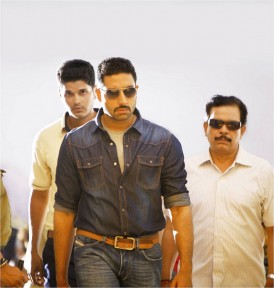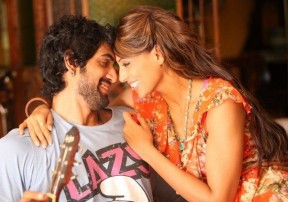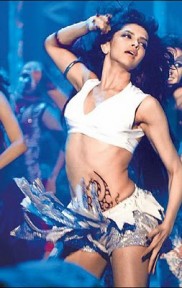 Ramesh Sippy’s cinema. Hema Malini’s Geeta grinning with happy malice atop a ceiling fan. Sanjeev Kumar shooting at the handcuff linking Jai and Veeru during a train robbery. Shakaal grimacing in a surreal den. Dum Maro Dum‘s opening credits recall some of these moments and the one thing you understand as the film unfolds is this. That some of the biggest hits in Indian cinema were about clarity and simplicity. And a screenplay that could hold water.
Ramesh Sippy’s cinema. Hema Malini’s Geeta grinning with happy malice atop a ceiling fan. Sanjeev Kumar shooting at the handcuff linking Jai and Veeru during a train robbery. Shakaal grimacing in a surreal den. Dum Maro Dum‘s opening credits recall some of these moments and the one thing you understand as the film unfolds is this. That some of the biggest hits in Indian cinema were about clarity and simplicity. And a screenplay that could hold water.
Dum Maro Dum has everything except the above three. Despite moments where you feel for the characters and a climax that shocks one like a sudden bullet shot, this is a film that could have been so much more and no, it is not Abhishek Bachchan’s fault.
Despite constant jibes that he can be nothing more than the shadow of success, the fact remains that he knows his way around roles that resonate with him. Refer to Yuva, Guru, Bunty Aur Babli, Dostana, Kabhi Alvida Na Kehna, even Refugee where he was subtle to a fault, especially as he was pitted against a Hrithik Roshan who had debuted with a double role in a charmed moment of celluloid eternity.
ACP Vishnu Kamath has the occasional lines that crackle (sikke ke do pehloo kabhi ankh se ankh nahin milate), the swagger of a man unafraid to kill or to be killed, a leaner and meaner body language but what he lacks is a cohesive graph.
Kamath is ostensibly scarred by a personal tragedy but you don’t see it translated in anything except a few stylishly cut images flashing past him. That rap song he sings while cleaning up Goa, that levity when he is torturing convicts makes you forget that you are seeing a man divided from life. Compare this to the taciturn cop in Zanjeer (and the surname of the lead actor is incidental here) who was made to internalise his childhood grief to a point where an entire song was woven around just that one moment when he breaks into a smile.
There is a moving scene in Dum Maro Dum where Kamath explains why he is no longer scared of being killed and how the memory of a loved one kept him from ending his own life but the film is less about one man’s angsty need to purge his pain and live a purpose bigger than himself and more about the glossy paraphernalia around him.
The story is a simple twist on the 70’s template of molls and ganglords. Lorsa Biscuta (Aditya Pancholi with henchmen of many nationalities), a drug mafiaso in Goa, stands in for the Dons of yore who smuggled gold biscuits. He runs his business with cold-blooded efficiency till a recently reformed cop comes along, starts messing with his head and his business and forces him to say,”Kamath! Kamath! Kamath!” like a typical Salim Javed villain.
Rohan Sippy has all the raw material to be an exciting director. Some of the cult films we remember from the 70’s were made in his backyard and in his work, we should have seen the best of the past blended with contemporary smarts but Dum Maro Dum is like a graphic novel where form controls content. Clever riffs of technology, frenzied cinematography (Amit Roy), a twangy background score inspired by the 70’s thrillers and eye filling locations do not make up for the fact that the film does not slow down to feel or register its story even though it keeps throwing ‘susegad’ at you..yes, the Goan word for living life like a lotus eater.
 Every scene is in a hurry to get to the next one. The love stories between Prateik and Anaitha Nair, Rana Daggubati and Bipasha Basu are dismissed in snatches of songs. There are poignant moments of loss and pain but they are few and far between.
Every scene is in a hurry to get to the next one. The love stories between Prateik and Anaitha Nair, Rana Daggubati and Bipasha Basu are dismissed in snatches of songs. There are poignant moments of loss and pain but they are few and far between.
The violence is brutal but the only thing that evoked audience response in the hall I watched the film in, was Govind Namdeo who gets to say some clever lines and says them like he means business. Prateik still has oodles of screen innocence and you know he is not faking it when he looks wide-eyed into the camera and cowers before a multitude of enemies.
Anaitha Nair makes the most of the few screen minutes she gets. Bipasha Basu looks sun-kissed and beautiful and efficiently plays a tragic version of her role in Jism. The towering Rana Dagubatti makes a surprisingly tame debut in a role that fades in and out of the narrative. He has soulful eyes, looks earnest in fruity T-shirts even though he is built like a truck and maybe will do better in an action-centric role. Vidya Balan in a cameo reminds you why hers is possibly the most interesting face we have today.
 The ensemble caste throws its weight behind Bachchan who brings what he can to a role written without the integrity that could have made him more than a wise-cracking cop in a cartoon strip. The last 20 minutes of the films are worth the price of a ticket as dead-bodies begin to pile up and a key character ends up in a crematorium.
The ensemble caste throws its weight behind Bachchan who brings what he can to a role written without the integrity that could have made him more than a wise-cracking cop in a cartoon strip. The last 20 minutes of the films are worth the price of a ticket as dead-bodies begin to pile up and a key character ends up in a crematorium.
The title song ripped off from a hypnotic classic and starring the singularly off-colour Deepika Padukone, sums up just what ails the film. Over-stylisation. And the absence of a beating heart.
Reema Moudgil is the author of Perfect Eight. (http://www.flipkart.com/perfect-eight-reema-moudgil-book-9380032870) . More on Story Wallahs. Other books by Unboxed Writers in our Store.






charmed moment of celluloid eternity indeed! perfect capture. makes me think you should write a piece on that moment…what say 🙂
ha ha, thats a thought 🙂